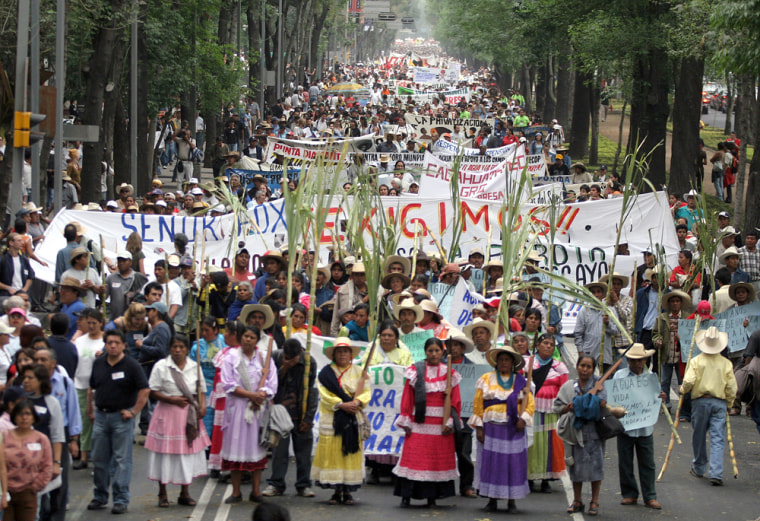The first day of a summit on the world’s water crisis ended with rage and frustration as police blocked the path of some 10,000 demonstrators who said their lands or livelihoods were threatened by water policies.
Police stopped the massive march late Thursday about a mile from the convention center where representatives of some 130 nations were attending the 4th World Water Forum in Mexico City. No major incidents were reported.
The forum pledged to focus on the world’s poor, many of whom live on less than 2½ gallons of water per day — one-thirtieth of the daily usage in some developed nations. But protesters said the conference represented big corporations interested in running water systems for profit.
Demonstrators came from the ranks of those who live daily with sewage pollution, including Mexican Indians whose water is being diverted to supply big cities and farmers whose lands are scheduled to be flooded by hydroelectric projects.
“You feel rage, you feel sadness,” said Delfino Garcia Velazquez, a construction worker from the town of Tecamac on the outskirts of Mexico City, where tens of thousands of new housing units have sprung up in the last few years.
Officials took over Tecamac’s formerly community-managed water supply — already over-stretched — to supply the new developments.
“We just want to have a say over our own water and manage it ourselves, like we always have,” Garcia Velazquez said.
Peacekeeping, migration factors
Local initiatives and community-level projects to supply, conserve and treat water were supposed to be at the heart of the water summit, but the larger, international dimensions of the problem often overshadowed that.
The forum heard a proposal for an international peacekeeping force to deal with future conflicts over water, as well as a call for massive donations to rebuild water systems in poor nations, in part to keep people from migrating to richer nations.
“A lot of poor people are leaving their countries to go to rich countries,” said Loic Fauchon, president of the non-governmental group the World Water Council. “Isn’t it preferable, isn’t it cheaper, to pay so that these people have water, sewage, energy, to keep open the possibility for them to stay in their (own) countries?”
He suggested the creation of a peacekeeping force — modeled after the U.N. “blue helmets” — to intervene in water conflicts, but said “we don’t want to override national governments, we just need a force that will take over.”
Mexico is no stranger to clashes over water. In 2004, armed Mazahua Indians took over a treatment plant and cut off part of the capital’s supply to protest water extraction from their land.
Privatization controversy
Forum organizers said they weren’t pushing privatization, but rather better water management.
“Nobody is talking about privatizing a resource that is something inalienable, sovereign,” said Mexico’s Environment Secretary, Jose Luis Luege. Still, he said he strongly supported granting water concessions to private firms.
That appeared unlikely to appease many demonstrators.
“We don’t want privatization because it will only serve as a business for someone,” said Cristina Hernandez, a 36-year-old housewife. “Services get more expensive with privatization, but not better.”
Hernandez said she lives on Mexico City’s northern outskirts near a lake that fills regularly with sewage from the metropolis. She said fish are dying and brownish green foam is forming on top of the lake, even as new housing developments continue to sprout up around it.
Asked if she thought the water forum would solve any of these problems, Hernandez said, “I don’t have faith in any officials anymore.”
